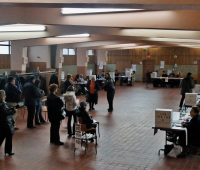In this undergraduate essay for the “Democratic Erosion” miniseries, Justin Saint-Loubert-Bie examines recent ballot restriction initiatives currently under consideration in various state legislatures. He explores whether these efforts—requiring presidential candidates to release their tax returns to be included on the state’s election ballot—could help bolster US democratic norms. Motivated by concerns about the current political climate and growing polarization, Saint-Loubert-Bie presents the arguments for and against these ballot restrictions. Ultimately, this piece asserts that these ballot restrictions could narrow the political divide and protect democratic norms, though he is unsure there is enough time.
Can representative democracies be strengthened to govern more effectively? The SSRC’s Anxieties of Democracy program is motivated by a concern about whether the core institutions of established democracies can capably address large problems in the public interest. The “Democracy Papers” highlight and summarize new research presented at conferences and workshops related to the Anxieties of Democracy program. Throughout the SSRC’s history, it has organized and sponsored committees and conferences on democracy, both in the United States and abroad. Most recently, before the Anxieties of Democracy program, the SSRC convened the National Research Commission on Elections and Voting in 2004, culminating in the publication of the report, Challenges Facing the American Electoral System: Research Priorities for the Social Sciences.
If you enjoy the “Democracy Papers,” you may also like our collection of reflection essays on the anxieties of democracy, The Inaugural Democracy Papers. These pieces were collected for the launch of the Anxieties of Democracy program in 2014–15.
Themes

How Georgia’s Exact-Match Policy Compromises Free and Fair Elections
by Emilie Nyholm Frydenlund LarsenIn the third installment of our 2019 undergraduate “Democratic Erosion” miniseries, Emilie Larsen examines how the exact-match policy used in the 2018 Georgia gubernatorial race to determine voter eligibility could undermine democratic institutions. Won by Republican Brian Kemp, this election has been mired by accusations of voter suppression, with the exact-match policy at the center, which some advocacy groups claimed undermined turnout in minority and predominantly Democratic areas. Larsen argues the use of the exact-match policy is a form of “stealth authoritarianism” that targets specific parts of electorate for disenfranchisement.

Abusing Referenda to Consolidate and Extend Power: The Cases of Rwanda and Burundi
by Rachel FunkIn this second undergraduate essay for our “Democratic Erosion” miniseries, Rachel Funk interrogates the susceptibility of referenda to abuse by government leaders. Using the examples of recent constitutional referenda in Rwanda and Burundi to extend presidential term limits, she explains how, in atmospheres with a history of violence and nominally democratic regimes that stifle political opposition, referenda can be manipulated to prolong the tenure of a leader under the guises of popular will and consent. Funk concludes by highlighting examples where referenda and other forms of direct democracy can play a more constructive role when combined with institutional checks.

How to Defeat Populism: Three Lessons from Slovakia
by Jenny W. XiaoWe kick off the 2019 round of our “Democratic Erosion” student essay miniseries—part of the Democracy Papers—with Jenny Xiao’s account of how this year’s elections in Slovakia bucked the trend toward right-wing populism in Eastern Europe. Xiao analyzes the successful campaign strategy of the progressive Zuzana Caputova, Slovakia’s first woman president. For Xiao, Caputova’s victory reflects her ability to build on public discontent and protest directed at the previous regime, a positive and inclusive message, and a direct engagement with populist candidates in ways that did not legitimize them or their use of disinformation.

Measuring Party Leadership Effectiveness in the US Congress
by Jason M. RobertsJason Roberts, a Negotiating Agreement in Congress grantee of the SSRC’s Anxieties of Democracy program, asks: How might we know whether the leadership of majority parties in the US Congress achieve their goals, and why? To measure the effectiveness of party leaders, Roberts first compares how much of a party’s publicly stated policy agenda is actually addressed through legislation. Second, he measures how well parties in the majority retain control in the House over somewhat arcane procedures that are essential for pursuing party goals.

How Fear and Anger Impact Democracy
by George MarcusIn this Democracy Papers essay, George Marcus addresses the important role that emotions play in politics. In a timely contribution to essays on the Anxieties of Democracy, Marcus delves into what we might broadly call the anxieties of citizens, distinguishing between the political consequences of fear and anger. In order to effectively address negative emotions in democratic politics, politicians first need to understand their distinctive psychological origins and consequences.

The Modern Origins of Our Epistemic Crisis: A Media & Democracy Workshop
by Michael Miller and James KirwanThe SSRC’s Media & Democracy program has launched a series of workshops that put current controversies and debates into historical and cross-disciplinary perspectives. Here, Mike Miller and James Kirwan provide the key takeaways from a recent event on “A Modern History of the Disinformation Age.” Scholars at the workshop engaged the roots of our “epistemic crisis” regarding what counts as facts and as “reality.” Participants focused on actors who benefit from the questioning of truth claims, and how institutions that once served as gatekeepers for such claims have been weakened and unable to adjust to new media ecosystems.

Scandals and Incivility in Congress: Do Legislators Face Consequences?
by Tracy SulkinIn a new submission to Democracy Papers, Tracy Sulkin looks at the professional consequences of legislators’ bad behavior. Using a unique dataset on professional scandals and instances of incivility committed by members of the US House of Representatives, she shows that scandals and incivility are linked to stalling professional career trajectories of members of Congress. In an era of polarization and gridlock, these results indicate that Congress does retain ability to police and sanction bad behavior among its members.

Representational Inequality and Welfare State Change
by Lea ElsässerIn an essay that continues the Democracy Papers’ current focus on welfare states, Lea Elsässer explores unequal representation in the context of welfare state reforms. Focusing on Germany since the 1980s, she shows that welfare state reforms are more responsive to the preferences of citizens in the upper socioeconomic classes, compared to those in lower socioeconomic classes. These findings contribute to the recent literature on problems of representation in modern democracies.

More Education for the Educated? Public Opinion on Social Policy Reforms in Western Europe
by Marius R. BusemeyerIn the latest contribution to the Democracy Papers, Marius R. Busemeyer explores which coalitions of citizens support various welfare state reforms in European countries. Recent years have seen the social safety net in these countries increasingly move toward a social investment model, whereby states help individuals invest in education and training. Busemeyer shows that, compared to other models of the welfare state, social investment policies enjoy broad-based support among many European publics, concerns about the potentially regressive effects of these policies notwithstanding.










